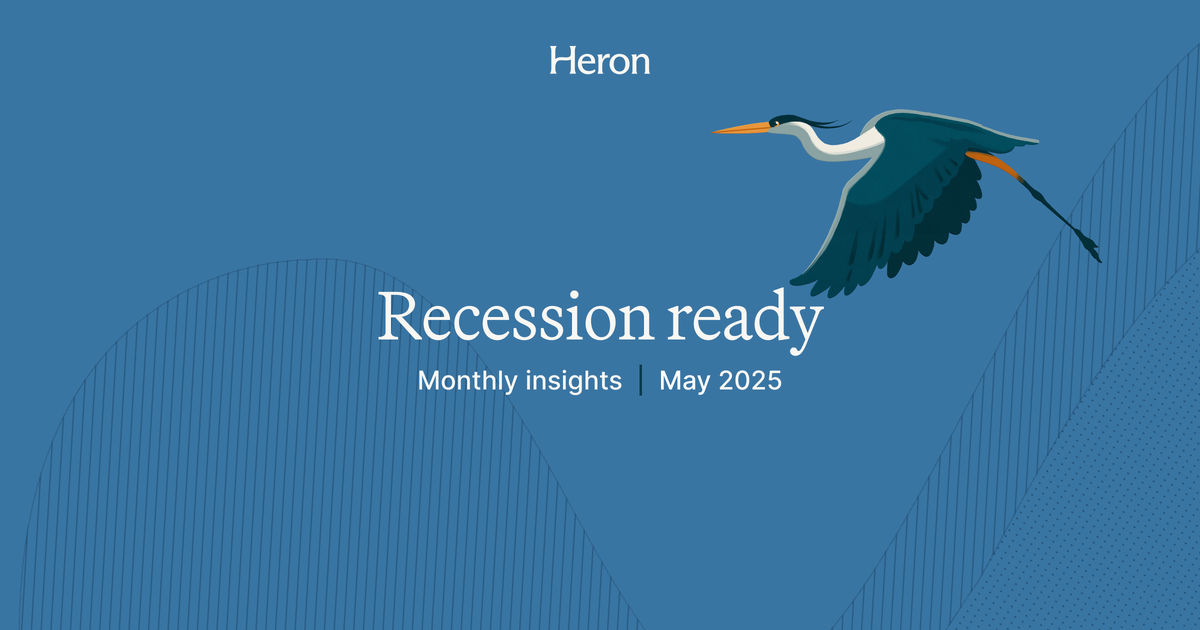Monthly Insights From Heron: Recession Ready (May 2025)
In our May 2025 Monthly Insights, we look at the odds of a recession this year, what a recession means for private credit, and how Heron is positioned for a downturn.

Monthly Insights #2, May 2025
In this issue:
- Odds of a recession in 2025
- What a recession means for private credit
- How Heron is positioned for a recession
- Q&A on Tariffs
- Quote: “The one good thing about being old…”
Current Events: Bracing for a Recession
What's going on?
Private credit as an asset class had a healthy Q1 2025, with industry-wide defaults at only 2.42%, down from 2.67% in Q4 2024. For comparison, the Q1 default rate for an average fund currently on Heron was 0.1%.
But, with tariff talks constantly evolving, recession odds have been hovering near a 50/50 chance, with a dip after a “truce” with China in mid-May:
- In April, J.P. Morgan Research raised the probability of a recession occurring in 2025 to 60% — up from 40% — and then back down to below 50% in May.
- Goldman Sachs put the chance of a recession at 45% in April, but on May 13 lowered the odds to 35% after the US-China tariff truce.
One thing is certain: There is uncertainty around a 2025 recession, and the risk remains.
How does it impact private credit?
Goldman’s take: In early May, Goldman Sachs published an article titled, Private credit’s outlook amid rising volatility, which clearly explained the benefits of high-quality private credit during recessionary times:
- “Lenders in the private markets are less likely to make loans to cyclical companies that are often more heavily impacted during volatile periods.”
- “Most private credit is senior lending, often characterized by more cautious underwriting. Senior direct lending sits at the top of the capital structure, meaning those creditors are the first to be repaid in a default, making it less vulnerable in periods of greater economic stress.”
A CEO’s take: The CEO from Ares, one of the world’s largest and most experienced private credit managers, doesn’t expect a rise in loan defaults despite market and economic uncertainty. (Heron portfolios provide exposure to the Ares Strategic Income Fund.)
- Ares CEO said, “We may see a quarter or two of negative growth, but I don’t think that that’s going to roll through the nonaccrual and default numbers.”
- Ares has been making lower risk loans, with their average loan made to U.S. private-equity borrowers having a 42% loan-to-value (LTV) ratio, which is much lower than the average LTV ratios during the financial crisis.
- Firms like Ares—with low LTVs, a focus on first lien loans, and high diversification—are positioned to experience less price fluctuations during volatile markets than junior debt and equity
Quality matters: During the Global Financial Crisis, first lien private credit loans performed far better than junior debt and the public markets, including leveraged loans, high yield bonds, and equity.
Between Q3 2008 and Q1 2009:
- First lien focused private credit portfolios declined by only 3%.
- Junior debt private credit portfolios fell 21%.
- High yield bonds and leveraged loans also lost over 20%
- Equities lost nearly 40%.
Focus on preserving capital: In a downturn, having a first lien position is critical to preserving capital:
- First lien creditors sit at the top of the capital structure, giving them first priority in the repayment waterfall.
- In a restructuring or default scenario, this senior position not only provides greater recovery potential, but also significant influence over the workout process—reducing the likelihood of losses.
- As a result, first lien creditors typically achieve recovery rates of 60–70% of loan principal—the highest among all tranches of the capital structure.
How would a recession impact Heron portfolios?
We can’t predict if or when a 2025 recession might happen, but our risk mitigation approach remains the same in all environments:
- Focus on first lien loans: Heron portfolios are made up of about 95% first lien loans.
- Focus on low LTVs: Low LTV loans, averaging about 40%, provide more cushion protecting lenders from losses.
- Focus on diversification: Our portfolios diversify across best-in-class, cycle-tested fund managers and thousands of loans.
While a recession would create short-term pressure on loan portfolio values and returns, we believe any drawdowns based on current recession estimates would likely be modest and temporary. Recoveries would likely occur within a few quarters, as history has shown for high-quality first lien-focused portfolios.
For more details, see our blog How a Recession Could Impact Private Credit—and Heron Portfolios.
Thanks for reading,
Khang Nguyen
Heron Chief Credit Officer
Invest in private credit with Heron >
From the Heron Blog
- Q&A with Monroe Capital: How Will Tariffs Impact Private Credit?
- Heron Finance Adds New Private Credit Funds: T. Rowe Price & More
Heron Fund Facts
Fact: Heron portfolios are diversified across 3000+ first lien loans and all 11 GICS sectors.
Why That Matters: Instead of investing in a single loan, sector, or individual credit manager like many other private credit investing platforms, Heron’s multi-dimensional diversification provides downside protection that most other private credit investments can’t provide.
Quote of the Month
“There is only one good thing about being old: you’ve seen market cycles.”
– PIMCO CEO, Emmanuel Roman

